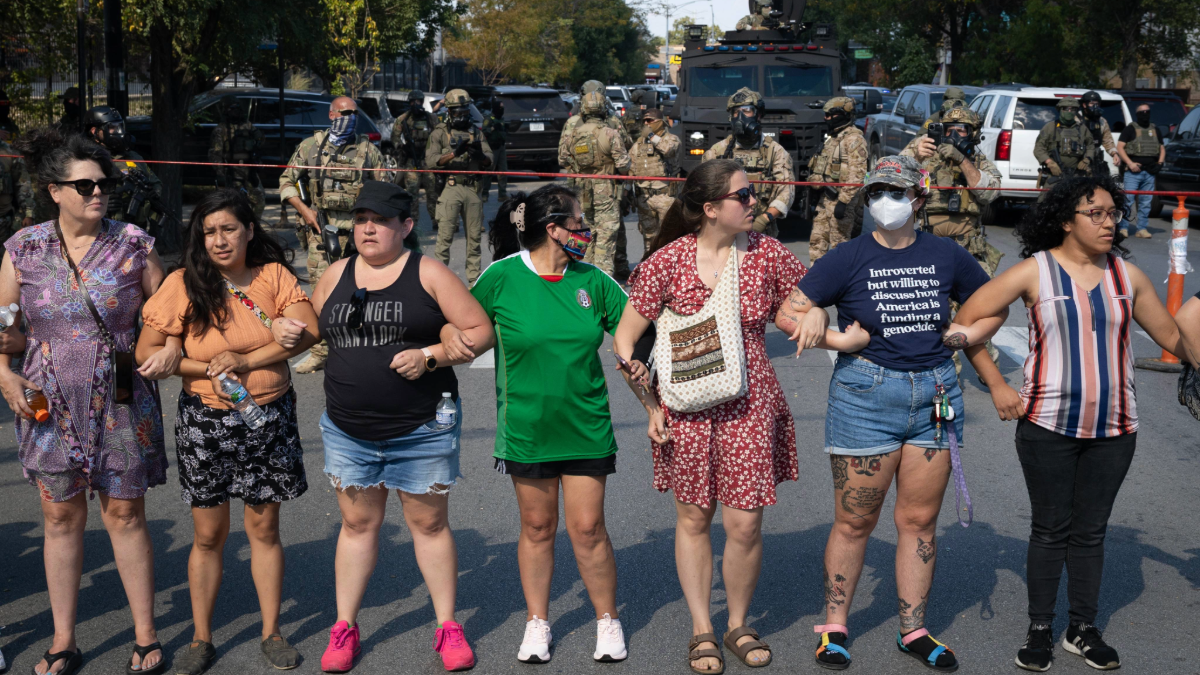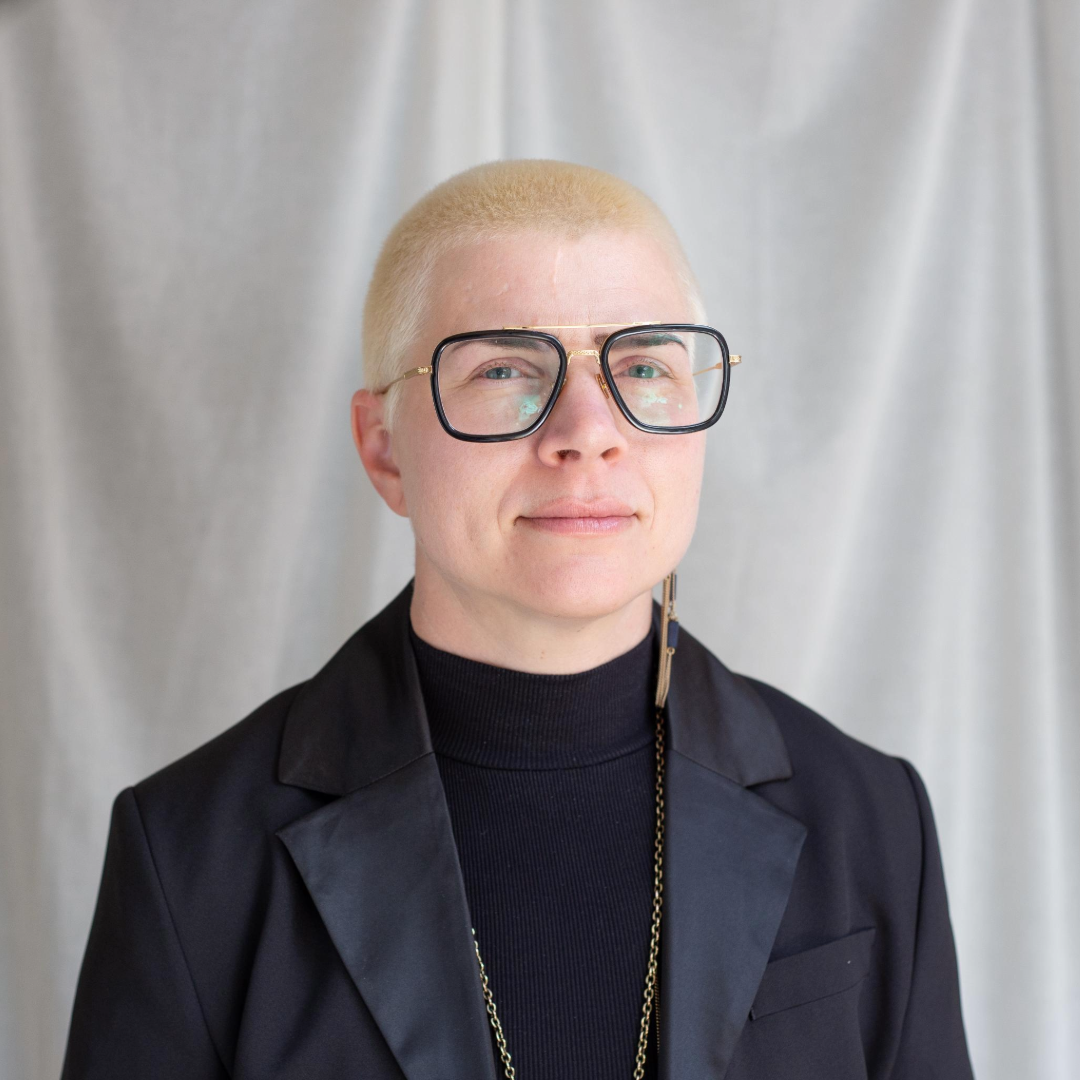It’s Time for Technologists and Tech Policy Advocates to Get Radical in Fight Against Authoritarianism
Dia Kayyali / Nov 6, 2025Dia Kayyali is a fellow at Tech Policy Press.

CHICAGO, ILLINOIS—OCTOBER 4, 2025: Community members and activists confront Federal law enforcement agents for reportedly shooting a woman in the Brighton Park neighborhood in Broadview, Illinois. (Photo by Scott Olson/Getty Images)
Former United States Vice President Dick Cheney is dead, but his legacy of oppression lives on. After the September 11, 2001 attacks, Cheney—who has been called the architect of the war on terror—helped build the modern national security apparatus that President Donald Trump is now exploiting. In The Nation, Spencer Ackerman wrote that “Cheney understood the catastrophe of 9/11 as an opportunity to accomplish and cement long-standing objectives,” and that he directed the creation of “an architecture of repression.” Cheney’s death provides an opportunity to consider the scope and scale of that apparatus, and to assess what will now be required to dismantle it, even as Trump threatens to use it to fully convert the US to an authoritarian government.
The fight for justice and rights for all is systemic, and it requires creativity and coordination. In the meantime, there are many ways individuals and organizations can continue to fight back. It’s time to break down the divide between “activist” and “ordinary person.” If the US is to escape authoritarianism, it’s time to get radical.
A stage set for a strongman
Trump entered an environment practically tailor-made for him, marked by unrestrained global corporate capitalism and constitutional weaknesses that have been exploited to diminish the power of the people in favor of corporations. Decades of trade globalization and insufficient oversight have concentrated wealth in the hands of billionaires who, by and large, support authoritarianism.
Corporate structures shield executives and profits from legal repercussions and facilitate rights violations. Oil diplomacy—essential for the global capitalist system—perpetuates human rights violations. The efforts of entities intended to protect human rights, such as the United Nations, are often ineffectual or marred by their unaddressed ties to colonialism. And in the US, the Electoral College and the Senate, which undermine the power of voters in populous states like California, lifetime appointments to the Supreme Court that protect clearly biased judges, and the relaxation of campaign finance laws have all helped to create the conditions for authoritarianism.
It is in this broader context that Trump is taking advantage of executive powers created and expanded over the past decades, in particular by men like Cheney after 9/11. He added International Criminal Court officials and Palestinian civil society organizations to the economic sanctions list maintained by the Office of Foreign Assets Control (OFAC), issued an executive order calling ‘antifa’ a terrorist organization, and targeted political opponents and marginalized communities in another executive order.
These actions build on relatively recent modern counterterrorism structures in the US. The oldest of these, the 1977 International Emergency Economic Powers Act (IEEPA) grants presidents the authority to impose sanctions without congressional approval; its use expanded dramatically after 9/11. The Antiterrorism and Effective Death Penalty Act (AEDPA) passed in 1996 created the modern system of terrorist designations and material support measures. Although a white domestic extremist, Timothy McVeigh, carried out the Oklahoma City bombing in 1995, the resulting legal framework primarily targeted foreign nationals. AEDPA provided the Secretary of State with statutory authority to designate “Foreign Terrorist Organizations” and made it a crime to provide “material support” to these organizations. It also laid the ground for the USA PATRIOT Act, passed shortly after 9/11. The “Specially Designated Global Terrorist” list was created by an executive order issued by President George W. Bush 22 days after 9/11, and has been reissued by every subsequent president.
Trump’s designation of Palestinian organizations and International Criminal Court officials mirrors the post-9/11 targeting of Islamic charities and civil society organizations enabled by this framework. For example, the Holy Land Foundation for Relief and Development, a Muslim charity, faced an extensive law enforcement investigation and effectively ceased operations after its OFAC designation. What the government may deem “material support” is not limited to money—it also includes providing training, an interpretation upheld by the Supreme Court in the 2010 Holder v. Humanitarian Law Project decision. Trump’s attention seems increasingly focused on the funders supporting civil society—including foundations that have become crucial to defending human rights domestically and abroad, especially in the wake of the cancellation of USAID operations.
It’s time to get radical
There are many ways individuals and organizations can resist authoritarianism, including technologists and tech policy advocates. Success will require breaking down the divide between “activist” and “ordinary person.” This is increasingly important, given the Trump administration’s efforts to target civil society and nonprofit groups. Nonprofits have long played an integral role in fighting for social justice in the US; but they are not designed to counter a dictator. Activists will have to adopt a diversity of tactics to protect their rights. These may include marches and electoral activism, but also direct action, such as strikes, or the physical obstruction of infrastructure.
Getting radical means being prepared to be uncomfortable, and to spend real time on activism. That’s because another feature of successful change is deep relationship building. Those who seek change can do something that can help now, but should do it with the goal of also building the relationships between different parts of a movement that must create a vision for structural change. Those relationships will also be important in defending against the ongoing targeting of vulnerable people.
There are so many options for ways to get involved now. Many communities in the US are doing things like collecting food for government aid recipients affected by the government shutdown, actions that could easily turn into more radical mutual aid. Lawyer and activist Dean Spade says “Mutual aid isn’t charity: it’s a form of organizing where people get to create new systems of care and generosity so we can survive.” Other opportunities to directly support people include observing immigration court proceedings, filming Immigration and Customs Enforcement (ICE) agents and reporting on their movements, providing specialized support like legal or digital security, or even physically resisting ICE abductions, including through street protest, as many people around the US are doing. Many people are also continuing to build alternatives to some of the structures of oppression mentioned above, such as community mental health lines or conflict mediation services that people can call instead of the police.
What’s next?
The election of Zohran Mamdani to be mayor of New York City is a reminder that many types of change are possible. In his victory speech late Tuesday night, he issued a challenge to Trump: “To get through any of us, you will have to go through all of us.” The biggest city in the US is going to be led by a Muslim immigrant, marking the possibility of a break from the trajectory of 9/11.
Those that seek change must learn from the past, fight in the present, and finally start thinking together about what is possible. Yes, that means addressing the bloody history of the US, and considering how to disentangle its role in the world from its decades-long mission to advance and defend globalized corporate capitalism. Goals such as dissolving the Department of Homeland Security, ICE, and the broader domestic surveillance state provide a platform, but more must be done to imagine the necessary statutory and constitutional reforms that will reverse the post-9/11 trajectory and neuter any future attempt to consolidate power in the hands of a tyrant.
For those of us in the world of technology and technology policy, moving forward means using our skills to identify and interrupt the use of technology in service of authoritarianism. Jessica Fjeld, Managing Director of the De|Center and an affiliate at the Berkman Klein Center, explains what it means to be a movement lawyer or a movement technologist in her article “Calling All Technologists: The Era of Neutrality Is Over.” It’s time to become part of the movement to fight authoritarianism.
This means we will have to decenter “professional expertise, and prioritize other forms of authority," as Fjeld suggests. It means not just “listening to” the most impacted communities, but instead valuing their expertise and allowing them to lead—and acknowledging the technologists and advocates who come from impacted communities. Being part of the movement also calls for not trying to do the most “sexy” or simple thing, like building yet another app for activists, but instead taking time to become part of activist communities and being available to provide insights into issues like Trump’s surveillance regime. And it means using skills to think creatively about how to dismantle the legal and administrative infrastructures that men like Cheney and Trump rely on to crush dissent. And of course, all the technology in the world will not change the fact that moving forward means investing in personal and community relationships.
Powerlessness is a tempting illusion when things seem overwhelming. Everyone has the choice to take action, right now, to fight authoritarianism.
Authors
